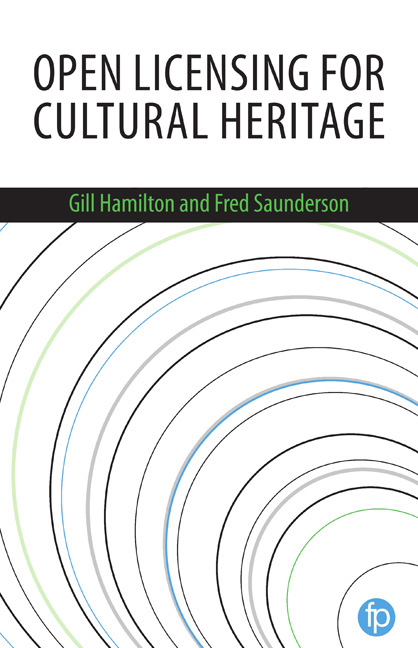Book contents
- Frontmatter
- Contents
- List of figures and tables
- Acknowledgements
- About the authors
- 1 Introduction
- 2 The open movement: its history and development
- 3 Copyright and licensing: a background
- 4 Open licensing: the logical option for cultural heritage
- Introduction to case studies
- 5 Small steps, big impact – how SMK became SMK Open
- 6 The British Library experience of open metadata licensing
- 7 Open policy and collaboration with Wikimedia at the National Library of Wales
- 8 Newcastle Libraries – the public library as a place to share culture
- 9 Developing open licensing at the National Library of Scotland
- 10 The Wellcome Library
- 11 Developing an open educational resources policy and open approaches to mitigate risk at University of Edinburgh
- 12 How to implement open licensing
- 13 Using and reusing openly licensed resources
- 14 Conclusion
- Index
14 - Conclusion
Published online by Cambridge University Press: 08 June 2018
- Frontmatter
- Contents
- List of figures and tables
- Acknowledgements
- About the authors
- 1 Introduction
- 2 The open movement: its history and development
- 3 Copyright and licensing: a background
- 4 Open licensing: the logical option for cultural heritage
- Introduction to case studies
- 5 Small steps, big impact – how SMK became SMK Open
- 6 The British Library experience of open metadata licensing
- 7 Open policy and collaboration with Wikimedia at the National Library of Wales
- 8 Newcastle Libraries – the public library as a place to share culture
- 9 Developing open licensing at the National Library of Scotland
- 10 The Wellcome Library
- 11 Developing an open educational resources policy and open approaches to mitigate risk at University of Edinburgh
- 12 How to implement open licensing
- 13 Using and reusing openly licensed resources
- 14 Conclusion
- Index
Summary
We hope we have given you sufficient justification for and practical examples of open licensing so that you are now in a position to consider making the case for its implementation in your organisation.
You have seen how the open movement has evolved since the 1960s into a variety of sub-movements, such as open data, open educational resources, and open government and that unbeknownst to most people, openness is in fact at the centre of our modern digital lives. We have hopefully brought clarity and understanding to the legal and statutory frameworks that surround intellectual property rights, explained the threshold of originality uncertainty that exists in UK law and described the public domain, licensing terminology and open licensing frameworks. In acknowledging that cultural organisations are open by nature and having armed yourself with an awareness of the regulations and the benefits and risks associated with open licences, you should be well placed to advance the case for open in your organisation.
The case studies demonstrate some of the different approaches that organisations take to being open. Sometimes these approaches are ad hoc and opportunistic, as in the early days of open licensing at National Library of Scotland, sometimes they are part of a specific project, such as the Wikimedian in Residence at National Library of Wales, sometimes they address challenging intellectual property issues head on, such as at the Wellcome Library, and sometimes they grow up in response to government calls to open public information, as in the case of the British Library's open metadata strategy. The University of Edinburgh shows how policy, training and awareness can support the development and distribution of open educational resources, and warns us against the dangers of copyright debt when failing to record attribution in teaching materials. Statens Museum for Kunst shows us how even when starting small, the impact of open can be huge both in cultural and social terms, and can go on to drive further open licensing and engagement. The experiences of Newcastle Libraries show that allowing people to use and reuse even a modest amount of content openly can be a powerful demonstration to managers that concerns regarding risks are unlikely to be warranted.
- Type
- Chapter
- Information
- Open Licensing for Cultural Heritage , pp. 209 - 210Publisher: FacetPrint publication year: 2017



